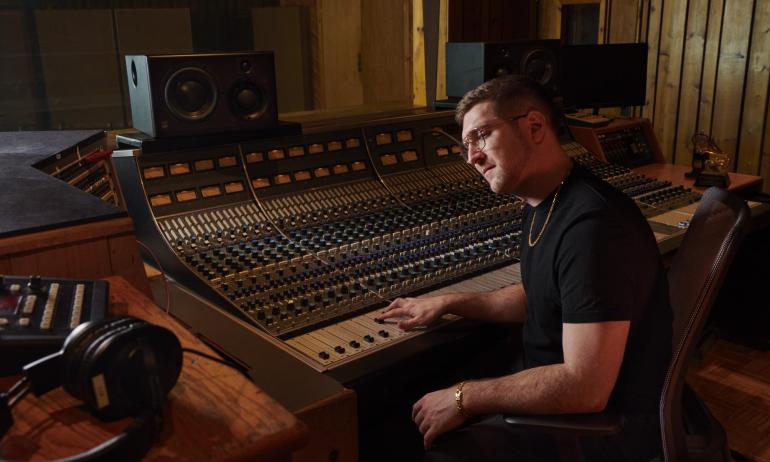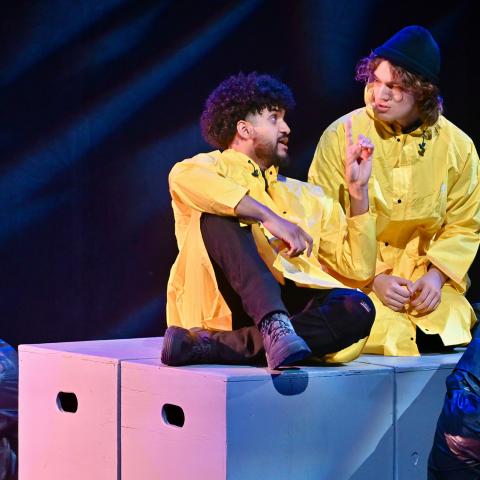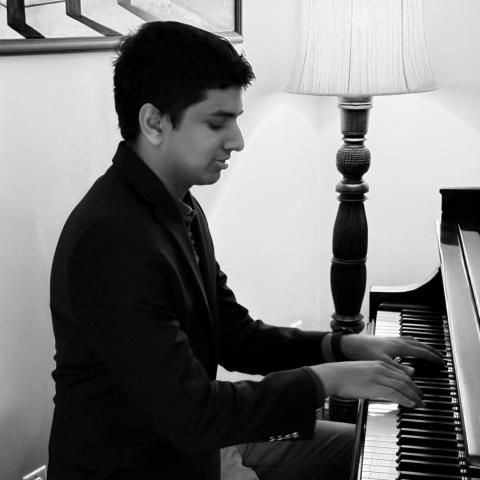London’s Top Jazz Pianist
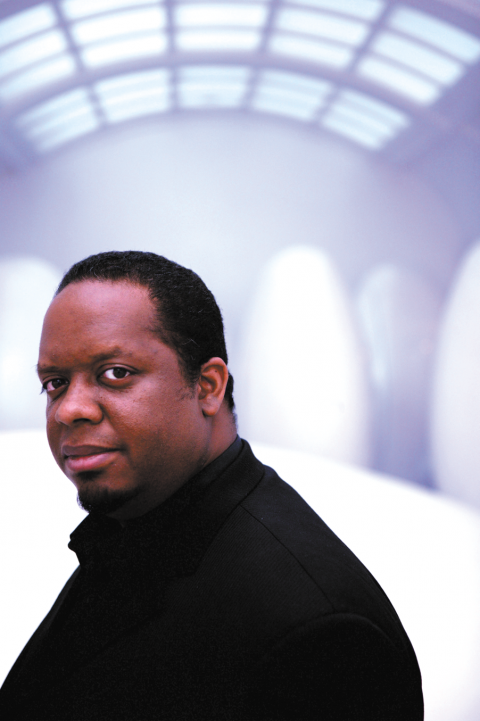
Julian Joseph
With his career as a composer, pianist, bandleader, and BBC host in full swing, Julian Joseph is like jazz royalty in England.
It’s a steamy July night in London, but it’s cool inside the famed Guildhall where 900 people await the appearance of pianist, composer, and bandleader Julian Joseph ’89. To an American, the massive Great Hall inside Guildhall, the locus of London’s city government since the Middle Ages, seems an unlikely setting for a big band jazz concert. The historically rich edifice—with its 60-foot-high ceilings, stained-glass windows, and statues of such national heroes as Admiral Lord Nelson, the Duke of Wellington, and Winston Churchill—is a site where royalty and state visitors have been entertained for centuries. Tonight, Joseph, who has attained the stature of jazz royalty in Britain, is doing the entertaining. The demographically diverse audience will be treated to a couple of jazz chestnuts, Joseph’s original music (including a three-part extended composition titled The Great Sage), and his jazz rewrite of George Gershwin’s Rhapsody in Blue.
Once the music begins, the admixture of history, tradition, and current ideas visible in the surroundings is mirrored in Joseph’s program and the setting seems appropriate after all. Joseph gives a nod to the jazz tradition through his arrangements of tunes by Monk and Ellington. And while he taps contemporary rhythms and compositional ideas, for the most part the heartbeat of his music is a driving swing groove. Joseph plays melodies and solos and jumps up from the piano to conduct concerted passages. He deftly guides his 19-piece ensemble through a vibrant performance that ultimately brings the audience to its feet demanding an encore.
While England and Europe as a whole are home to numerous classical artists who are major concert attractions, the number of British jazz musicians who can lure as many listeners to a concert as Julian Joseph can is small. Jazz is not indigenous to this land, but the British do have an appetite for it. In his work as a presenter for the BBC Radio show Jazz Legends, Joseph gets to do a bit of proselyting to build jazz awareness. The broadcast, received throughout the United Kingdom and other European countries, might feature Joseph chatting with contemporary artists such as John Scofield or Pat Metheny about their own careers. On other shows Joseph may dedicate the time to exploring the contributions of jazz icons from the past like Benny Goodman or Django Reinhardt.
Mindful of how difficult it was for him to get information on the fundamentals of jazz in his pre-Berklee years, Joseph often acts as a spokesperson and proponent for jazz in England. He was a key figure in the recent establishment of the country’s jazz education standards and is a patron of the Jazz Development Trust. With his music, Joseph also has attracted listeners from the classical world. In 1994 he seized a historic opportunity to be the central performer in a series of four jazz concerts at Wigmore Hall, one of London’s great bastions of classical music. The performances featured a solo piano concert, a piano duel with fellow British pianist Jason Rebello, and two drummerless trio settings in which Joseph and bassist Alec Dankworth backed saxophonist Johnny Griffin and clarinetist Eddie Daniels on alternate evenings. The effort paid off, and doors continued opening with offers for additional jazz bookings as well as opportunities to compose for and play with symphony orchestras.
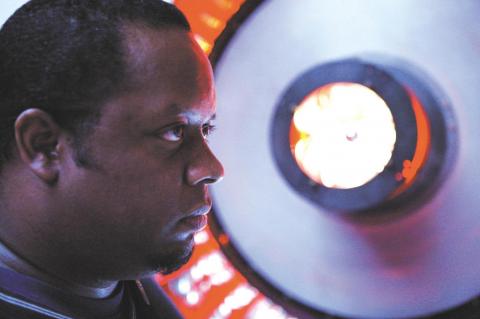
Joseph’s parents came to Europe from the West Indies, and the entire family is musical. Joseph’s dad sang with r&b and blues groups in the 1960s; his mom played a bit of piano and saw to it that each of her three sons studied music. Today, three family members are involved to some degree in Julian’s career. Ursula, Julian’s mother, is an accountant and manages the books. Older brother John is a trumpet player who plays with the Julian Joseph Big Band, and younger brother James manages all legal and business aspects of Julian’s career.
At 37, Joseph has accomplished much in finding his musical voice and building a career that, like some of his American jazz idols, will likely keep him in demand for many years. For now, the distant future isn’t something Joseph tends to spend a lot of time pondering. Like any jazzman, he lives in the moment. The gigs, his latest composition, and media commitments are filling the hours nicely.
How old were you when you began learning music?
I was six or seven years old and was exposed to classical music at first. I took to it like a duck to water. I didn’t enjoy my first teacher as much as my second. My two brothers and I took lessons from the second teacher who was very encouraging and had great energy.
Was it in your secondary school years that you became interested in jazz?
Yes. My brothers and I would listen to every radio station we could find that had jazz. I remember seeing an Oscar Peterson special on television. It’s not that I really knew what jazz was, it’s just that I was drawn to it immediately, and I started to attempt to play it.
An actor named Errol Shaker whom my brothers and I met introduced me to a lot of different music. He bought us a record by Ramsey Lewis. I figured out the blues scale from listening to that and then I worked out the Gershwin song “Summertime” in a very simple way. I remember running into the dining room and telling my mother, “I can play jazz!”
How did your training progress?
My piano teacher moved away for a while, and I had no lessons for a few years from the age of 10 to about 12 or 13. I found a very good teacher at school who introduced me to Art Tatum and Thelonious Monk. I hadn’t heard them before. I was already interested in Herbie Hancock because he was a pop star when I was a child. He had a hit with the song “I Thought It Was You” from the Sunlight album. That record only did well in England. I really loved the electric piano solos. From then on, I really wanted to play jazz. I started studying with this really great teacher, Fred McNichol. He was a virtuoso but didn’t really play jazz, so I had to figure out much of that on my own. I also had a drum teacher who used to make these amazing tapes of jazz musicians for me. He gave me so much music; it was almost like the history of jazz.
How did you come to Berklee?
To people who don’t live in America, Berklee is a mecca. I had been thinking about coming to Berklee, but I thought I could never get into the school. My teachers helped me by writing references for me. I had been going to see Art Blakey and the Jazz Messengers since I was very young and had met Mulgrew Miller, Donald Harrison [’81], and Jean Toussaint [’79], who were in the band. Donald was instrumental in telling me who to get in touch with at the college. All of those guys and Art Blakey signed a letter of reference for me to send with my application for admission.
I was fortunate to get a scholarship from the Inner London Education Authority. They offer a few scholarships each year for people to go and study abroad, and they gave me the funds to study at Berklee.
What was your major at Berklee?
It was traditional composition. The reason for that was that I knew I wanted to play jazz, and I knew how I wanted to sound. I wanted to learn techniques that I wasn’t aware of to help me compose the best music I could. Herbie Hancock had studied composition, and I found him to be a big inspiration. He was the door opener for me. He was so versatile and had played with so many people that listening to his recordings exposed me to artists like Miles Davis, Eric Dolphy, Freddie Hubbard, and many others.
Were any Berklee teachers influential in your development?
My piano teacher, Donald Brown, had a huge influence on my playing and on my listening. Every time I went to his classes or lessons, he would let me borrow tapes of various people. He was teaching through repertoire and encouraging me to learn tunes and play them with my friends.
I understand you still work frequently with Adam Salkeld [’88], one of your former Berklee roommates.
Yes, he is a great guitarist and he works with me in my quartet and big band all the time. Adam was also from London. I didn’t know many British people when I was at Berklee. A drummer named Dave Schirmer kept telling me about this English guy he knew who was a great guitar player and introduced us. Adam and I became very good friends. A while later, we did a jam session, and I couldn’t believe how well he played. He had a great feel and melodic direction, and he played the changes with incredible ease.
How did you come to work with Branford Marsalis?
I had met his brother Delfeayo Marsalis [’89] at Berklee through Javon Jackson [’87]. Delfeayo was interested in a lot of different styles and players. He told me that his brother Branford was coming to town and that they were going to have a session. He asked if I wanted to play. I said sure. The Marsalises were superstars to me. When I played with Branford, I felt completely inadequate. But he was really encouraging and positive. It transpired that shortly after that session, Kenny Kirkland wasn’t making some of the gigs with Branford’s band, and Branford decided to get someone else. Delfeayo told him to call me.
He called and asked me, “What are you doing tomorrow?” I said I didn’t think I was doing anything. He had me fly to Jacksonville, Florida. When I got there, there was a limousine waiting. The whole thing was a bit overwhelming for me. When I came face-to-face with him at the hotel, I was so in awe that I couldn’t say anything. He was cool, though. I ended up going on the road with him for nearly 12 months playing weekend gigs all over America and Canada.
Was this during the time you were studying at Berklee?
Yes, it started in my second semester. Things were starting to happen for me then. A week before I got the call from Branford, I went to hear Donald Harrison and Terrence Blanchard playing at the Regattabar. Donald told me he wanted to get me into their band. I guess there was sort of an air of expectation that things would open up for me.
How did things get going professionally back in London?
I had played with [saxophonist] Courtney Pine in London. I met him when I was attending Weekend Arts College. I had joined him on some of his tours in America when I could and I also played with him when I was in London. There was a lot of interest around both Courtney and the Marsalises, so when I returned after Berklee, there were record companies in London interested in signing me. By the time I graduated, there were four contracts on the table.
A subsidiary of Warner Bros. was your choice wasn’t it?
Yes. I signed with Warner Bros. because Malcolm Dunbar, the guy who signed Courtney Pine, had just moved from Island Records to a small label at Warners called East West. He was the head of A&R and wanted to sign me.
How did you begin receiving recognition in London and beyond?
One of the most important events in my musical career took place in 1995 when I was invited to play the Proms. It’s the biggest and longest-running classical music festival in London. That was where I launched my big band, and the response was so overwhelming that it led to many of the things that I do now. The program was all original music or pieces arranged by me, and it was presented on BBC Television to a national audience of over six million and broadcast on radio as well as all over Europe. That exposed me to many people who hadn’t heard me before. I had some superstar players from the British jazz scene, people like Guy Barker, Andy Shepherd, Peter King, and Jean Toussaint.
When did your BBC Jazz Legends show come on the air?
Some time had passed before I began doing that show; it started in 1999. I had often been called in to the BBC to talk about various things having to do with jazz. A few of the BBC producers asked me if they could put my name forward to present a show. Felix Carey at Radio 3 contacted me when the BBC upped their commitment to jazz and world music. Their focus is still on classical music, but they want to present other things that will be interesting to intelligent, discerning listeners. They had me come in and record a show as a trial. The next day, they called me to say that they wanted to do the show.
I understand that you have hosted television shows too.
Before the Legends show, I presented some TV shows for the ITV Network’s Meridian channel as part of their master class series. They were featuring master classes with a dancer, a painter, an actor, a jazz musician, and a classical musician. I was the jazz master and brought in a student for the show to present to the television audience. They really liked it and decided to give me a show that they imaginatively called Jazz with Julian Joseph. I did two series for them. After that, I got an offer from the Sky Channel for a show called Jazz World. For that I did interviews with such people as Medeski, Martin, and Wood, Wynton Marsalis, Geri Allen, and Mike Stern and presented their music.
Listening to your big band music the other night at the City of London Festival, I heard a nice blend of the jazz vocabulary and traditional European sounds. Among the fat jazz voicings in the horns, there would occasionally emerge simple but lovely triads at key places. It was a nice juxtaposition of colors.
I love to mix things together. I think the big, juicy jazz voicings really stand out against the more open sound of the triads. Herbie Hancock has created some very beautiful colors by using inversions of a simple voicing. So I use inversions and triads. It’s all valid.
What would you like to contribute to the jazz legacy through your writing?
I’d just like to experiment as much as I can and blend the things that I like in music. I really love Duke Ellington, Beethoven, Chick Corea, Prokofiev, Thelonious Monk—a whole range of music. Often when a jazz musician writes larger compositions for a big band or orchestra, you don’t seem to get the big harmonies as much anymore. The harmony might stay on one chord for a long time. I like my music to be harmonically rich and diverse and developmental. I like to try to mix elements so that it remains interesting and the ear is always being drawn to the next thing in the music.
As a musician, I want to play as well as I possibly can. I want to use the influences of the great players and yet have an identity of my own. My vision is to extend my big band’s repertoire to include compositions from talented British composers arranged by them or me. I want to show the way we are thinking over here and how that mixes with the influences of music from America. I also want to make familiar the names of British musicians like Jason Rebello, Cleveland Watkiss, Steve Williamson, and Courtney Pine. I want others to know about the richness of the kind of music we are creating over here.
Do you have any role models for your writing for big band and orchestra?
Harry Connick Jr., Wynton Marsalis, Jaco Pastorius, Charles Mingus, Wayne Shorter, and Kenny Kirkland all wrote great music for larger ensembles, I draw a lot of inspiration from guys like that. They are ultramodernists, but the harmony, melodic direction, attention to detail, and musicality are there. All the principles that make music strong in my estimation are present, and those are the qualities that I am striving for in my own music. I want it to have a strong, swinging vibe and intensity and a really good energy that is timeless. That’s something we associate with youth. It would be wonderful to bring that to the world in the consistent way that American musicians have time and time again.
On the other side of the musical coin, you have been invited to appear as the piano soloist for classical piano concertos with orchestras. What works have you performed?
I have played most of the George Gershwin concerto pieces. I played his Concerto for Piano and Orchestra in F with the Royal Philharmonic Orchestra. I also did Rhapsody in Blue with the London Symphony a few years ago and his Rhapsody for Piano and Orchestra No. 2 with the Residentie Orchestra in Holland. Gershwin was an amazing writer and someone who related strongly to the people. He never lost his touch when it came to communicating with the people. He really tried to compose in a classical form but ultimately he was more of a jazz and Broadway musician. Today’s equivalent might be a jazz/pop musician who tries to write in classical form.
I am not really trying to write in a classical form. I’m just trying to blend my influences in the way that I like to hear things. Most of my capabilities have come from studying jazz and from the openness of the way jazz musicians think. Someone like Herbie Hancock has the ability to sound like everyone and no one. In my interviews for the BBC shows, I interviewed John Scofield and Pat Metheny. Both cited Herbie as their favorite living musician. There is a reason for that. Everything is there in Herbie in a way that is very musical, human, and uncontrived. I was really lucky to have his genius catch my ear at an early age.
You sit on various boards in London that make decisions about the direction of jazz education and funding for jazz performances. Can you discuss what your role is?
I have been involved in promoting the new Associated Board [of the Royal Schools of Music] syllabus for jazz. The board had defined a grade system of standards for classical music education in England. That grade system is now being applied to jazz and the board called me to get involved in helping them to promote that. I’ve been very fortunate in some of the things I have been involved in. I feel like a blessed person moving from one thing to the other and not feeling a halt in my creativity.
Is it true that you are thinking about launching your own record label?
We are working on that at the moment. I haven’t released a record in quite a long time. I have two albums in the can waiting to come out, and I am very eager to release the new material. This seems like a good time to set up your own label. The record industry has changed a lot—especially for jazz musicians. The major labels are not too interested in us because they don’t see us having big financial potential. I think they are wrong and there is a new frontier in the music business for creative artists.
You maintain a website (www.julianjoseph.com). Are you convinced that the Internet will play as big a role in developing that frontier as many are saying it will?
I think the Internet will play a huge role. It links us all together so we can communicate and have immediate access. The ability to hear and see things through the Internet is very important. It enables you to cultivate your own business network.
What are your priorities for the coming years?
Live playing is the important thing. I like to tell other musicians that you can’t take anything for granted. In this business, everything goes up and down. If you are signed to a record label, don’t think that it is the be-all and end-all. I want to keep playing and know that people want to keep coming out to hear me. I also want to work with people who are fantastic players and know that they want to play with me. It’s really that simple for me.

